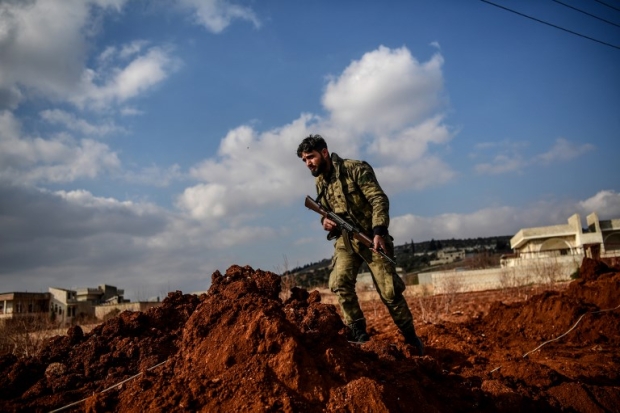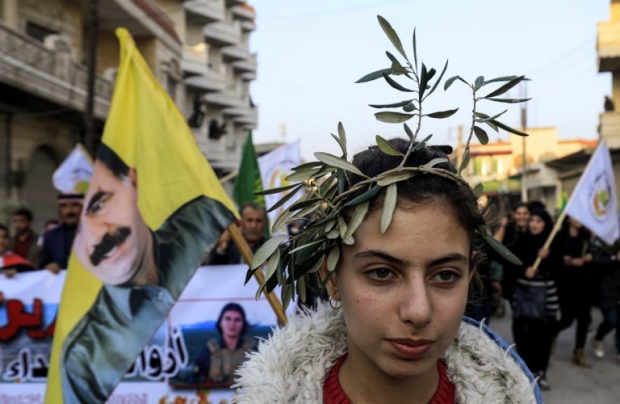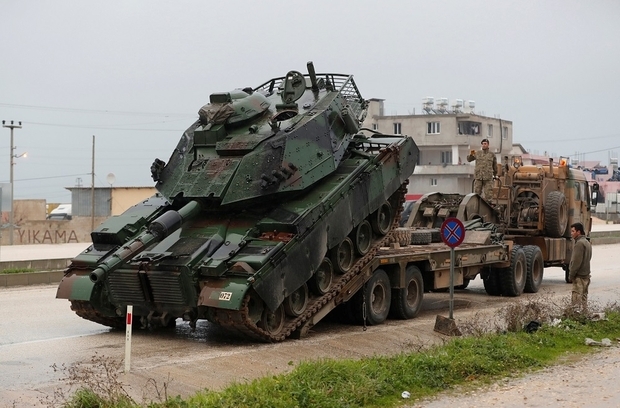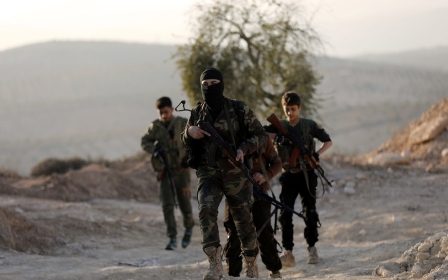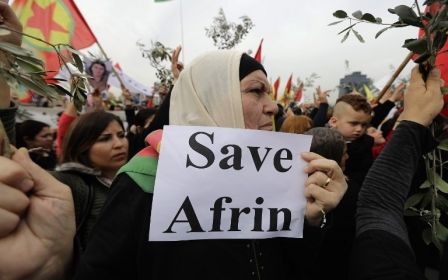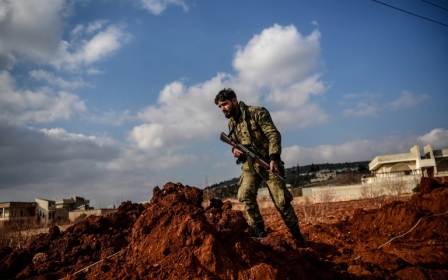ANALYSIS: Syrian army in Afrin - Kurdish lifeline or deal with the devil?
QAMISHLI, Syria – A move into Afrin by Syrian government forces does not necessarily mean a Syrian-Turkish conflict, but could have major implications on the Syrian civil war and regional power relations, analysts and actors in the Kurdish enclave have said.
Kurdish officials said on Sunday four days of talks had brought them close to an agreement on a Syrian government presence in Afrin, which has been besieged by Ankara-backed rebels and the Turkish army for over 30 days as it moves its "line of control" away from the Turkish border and into Syria.
On Monday, Syrian state media said the government was "hours" from sending forces into the region to "repel" Turkish forces, a claim Turkey said could go one of two ways - confrontation if the deployment reinforced Kurdish forces, cooperation if it aimed to remove them from the fight.
We as the SDF call on the regime to do its duty
- Nouri Mahmoud, YPG spokesman
Ankara is targeting YPG forces in Afrin, which it describes as a "terrorist force" linked to the PKK - a group that has waged a decades-long conflict against Turkey. The YPG has denied the links, and has in turn accused Turkey of working with groups like Islamic State.
The Syrian government has clashed with Kurdish forces in the past, but has largely left Kurdish territory alone and has agreed power-sharing deals such as in Qamishli, as it fights revolutionary rebels and groups such as Islamic State.
Nouri Mahmoud, a spokesman of the YPG, which is part of the larger Syrian Democratic Forces (SDF), told Middle East Eye that he expected the government of Syria would "do its duty" to defend Syrian territory from the Turkish incursion.
"We as the SDF call on the regime to do its duty," he said. "If there are external attacks we should forget our internal differences and protect Syria. But the regime has not done its duty yet in Afrin.
"If we finish this problem, we could resolve our differences."
'No direct conflict'
But a government deployment was not being seen inside Turkey as the spark for a direct conflict between Ankara and Damascus.
Ahmet Kasim Han, a professor of international relations at Istanbul’s Kadir Has University, said any attempt by the PYD/YPG to present the arrival of Syrian forces as a victory was "beyond ridiculous".
"They end up ceding territory that they were hoping to use as a bargaining chip for major concessions to the Syrian government, for nothing," he said.
"It also helps validate Turkey’s position that operation Olive Branch promotes the territorial integrity of Syria."
Turkey and the FSA... will be quite happy to consolidate and maintain this new line of control
- Ahmet Kasim Han, professor of international relations
Han, who was among the first analysts to forecast Turkey’s Afrin offensive, said the potential movement of Syrian government troops into Afrin did not substantially change the picture.
"Turkey and the Free Syrian Army are content with the gains they have made so far. They will be quite happy to consolidate and maintain this new line of control," he said.
According to Han, while the risk of regional escalation always exists, Afrin is too inconsequential in terms of the larger picture in other parts of Syria where such a risk is greater.
"Syrian government forces would need to be very foolish to attack Turkish troops on behalf of the PYD/YPG," he said.
"I have no doubt that eventually Syrian forces will take over Idlib for example. Places like that and others in Syria could prove bigger flashpoints in terms of an escalated regional conflict.
"As far as Afrin goes, the Russian position will prove the determining factor."
Han also said the likelihood was that it would be Iranian-backed forces rather than regular Syrian government troops moving into Afrin.
'Turkey will leave Syria'
What, then, would any deal with the Syrian government bring for the Kurds?
According to the Firat News Agency (ANF), a semi-official news agency close to the YPG, negotiations were held between senior YPG and Syrian army commanders over recent days, initially stalling due to Russian interruptions.
The agreement would include a no-fly zone over Afrin, and would allow the Syrian government to establish a base, according to the ANF. It would also see the Kurds hand over some border points to the Syrian army, it added.
Sihanok Dibo, an adviser to the PYD presidency - the political wing of the YPG - told MEE that he believed any such deal would mean Turkey would have a choice to either leave Syria, or face another faction on the battlefield.
We will not accept the situation in Afrin to return back to 2011, as the Baath Party in Damascus wants
- Sihanok Dibo, PYD adviser
"The question is not whether we will have a tactical or strategic deal with the (Syrian) regime. The question is if Turkey will accept it - they will not, because Turkey would not be able to stay in Syria anymore," Dibo added.
However, he said that the Syrian government would not be allowed to take over the region - it would need to include Damascus accepting a local administration in northern Syria and sharing natural resources and services, he added.
"We will not accept the situation in Afrin to return back to 2011, as the Baath Party in Damascus wants," Dibo said. "What will happen is negotiations and compromise."
The Kurds have already rejected a Russian proposal, made before the Turkish incursion began, of handing over control of Afrin to Damascus.
Shahoz Hassan, the leader of the PYD, said that he rejected the Russian options.
"Russia says - either Turkey will attack you and occupy Afrin or the regime will come and enter Afrin. And we do not accept this," he said.
"We say that within the federal system in Syria we can reach an agreement and the regime will protect its borders in Afrin, but we will not compromise on its administration."
The American question
Such a deal would also raise questions about US military presence in northern Syria, and its continued alliance with the YPG/SDF in the fight against the Islamic State.
In January the US secretary of state, Rex Tillerson, said US troops would remain in Syria, not just to fight IS militants, but also to counter the Syrian president, Bashar al-Assad, and his ally Iran.
According to Aaron Stein, a resident senior fellow at the Atlantic Council's Rafik Hariri Centre for the Middle East, the US could eventually accept a deal between the Damascus government and Kurdish groups.
"It depends on the terms, of course, but in the abstract, the regime takes back control over territory that it had lost," he said.
"The US would quietly acquiesce. If the YPG wants it, what can the US do? They have to manage this relationship for the benefit of the counter-IS fight," he added.
A possible deal between the Kurds and the Syrian government could also give the US a way to exit from Syria, since it probably doesn’t want to keep its troops on the ground in Syria forever.
Aron Lund, a fellow at the Century Foundation, believes a possible deal would undermine the Syrian rebels that still hold some areas on the Turkish-Syrian border.
"The goal might not be to retake areas captured by Turkey and its rebel allies, but to simply stop them.
"The YPG is trying to sell this as a limited concession on border security, but I suspect Assad will have taken his pound of flesh - maybe in the form of some level of political and administrative control, despite YPG denials, or in the form of concessions that relate to their relations outside Afrin," he said.
Winners and losers
Lund said the major question would be whether Russia was ready to underwrite a compromise deal struck between Damascus and the Kurds.
Agreement, he said, "would decisively stop Turkey in its tracks".
"They can't go up against an Assad-YPG combination if Russia puts its air defences and aircraft at Assad's disposal," he said.
"And more importantly, depending on what has been agreed, Turkey could find a solution where Assad takes the Kurdish enclave in hand to be good enough.
"They'd prefer for YPG to be obliterated, but if Assad can use this opportunity to chain the Kurds to the Syrian state, then maybe that satisfies Ankara's most urgent security and political needs.
"The big losers in that equation, of course, would be the Syrian rebels - who would then realise that they have essentially been acting the bad cop to Assad's good cop, leaving him to reap the spoils."
- Suraj Sharma contributed to this report from Istanbul
This article is available in French on Middle East Eye French edition.
New MEE newsletter: Jerusalem Dispatch
Sign up to get the latest insights and analysis on Israel-Palestine, alongside Turkey Unpacked and other MEE newsletters
Middle East Eye delivers independent and unrivalled coverage and analysis of the Middle East, North Africa and beyond. To learn more about republishing this content and the associated fees, please fill out this form. More about MEE can be found here.


